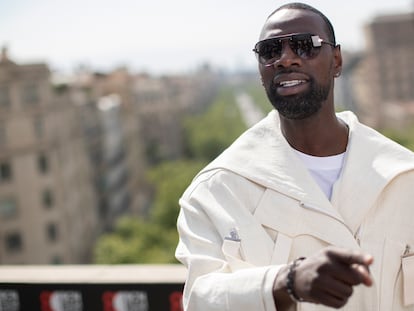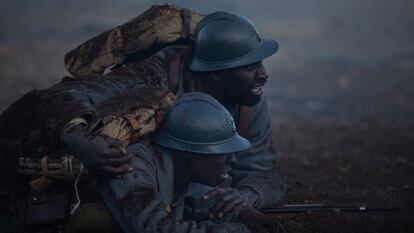Omar Sy, star of ‘Father and Soldier:’ ‘Wearing the uniform in which so many Senegalese riflemen died in WWI made a big impression on me’
The popular star of ‘The Intouchables’ and double award winner at the recent BCN Film Fest in Barcelona does not consider himself a sex symbol at all


In the wake of the Oscar-winning new German adaptation of All Quiet on the Western Front comes the French film Father and Soldier, another movie about World War I — a conflict that has been the inspiration for numerous critically acclaimed films, such as The Grand Illusion, Paths of Glory and Captain Conan. Recently screened at the BCN Film Fest in Barcelona, Father and Soldier tells the story of a Senegalese cowherd, Bakary Diallo, who enlists in the French colonial army to protect his son Thierno, who has been forcibly enlisted. Both are sent to fight the Germans in France as part of the famous Senegalese rifle corps (les tirailleurs sénégalais), which was the main element of the French army’s “Black force.” Father and son experience the horror of trench warfare together, while the father tries his best not to let his son die in a conflict in which 30,000 of the 180,000-strong mobilized corps (one in six soldiers) perished. Diallo is played by Omar Sy, the actor with Senegalese roots famous for his roles in The Intouchables and the French series Lupin. Sy visited Barcelona for the festival and received one of the event’s honorary awards, as well as the award for best actor, since Father and Soldier had been nominated in the competition.
What was it like to be a Senegalese rifleman in World War I? “It was just as the film shows,” Sy replies. “They were very isolated, first because of the language. Most of them didn’t speak French but Peul, which is what Bakary and his son speak [and is the language of Sy’s own parents], Wolof, or other dialects, so they didn’t understand what was going on. And then there was that horrible war that was beyond the comprehension of anyone in Senegal: They didn’t know who they were fighting, or why. Added to that the climatic conditions of winter at the front: the Africans died of cold, they were not adapted to this hostile world. Not to mention that, as the film shows, many Senegalese had been recruited using the methods of the slave trade, by kidnapping them”.
Sy, who regrets not having seen All Quiet on the Western Front yet, reflects that to be a Black man in the Great War, when the inhabitants of Senegal did not have the status of French citizens, was simply to be “a colonial tool and nothing more.” Interestingly, Father and Soldier shows no instances of racism. On the contrary, the white lieutenant Chambreau exhibits a surprising lack of prejudice (although it is also true that for suicide missions color did not matter much), there is even a suggestion of an interracial love story, and the fact that Black non-commissioned officers could go to military brothels is mentioned. “The brotherhood of the front prevailed,” the actor points out. “They were in a war, and they were fighting together. In a way, all French soldiers were brothers in arms. Everyone felt the same vulnerability when faced with the slaughter at the front.”

In the U.S. Army, Black soldiers fought separately. “America is another story, which deserves another movie. The story we are talking about is the story of the French colonial troops. In the U.S., slavery was still a recent phenomenon.” The actor says that the struggles for integration faced by the Buffalo Soldiers (the Black soldiers who fought in the campaigns against the Native Americans) or the Tuskegee Airmen (the Black airmen of World War II) do not particularly appeal to him. “I really like history in general, though,” he says. He admits, however, that his own military experience is “nil.” Well, not anymore. The actor laughs heartily. He notes that playing a soldier was not difficult for him, especially because Bakary was a soldier by force, and never bought into the military mindset, unlike his son, who became a sergeant. “I actually like the father side of the role better than the soldier side,” he says.
Putting on a Senegalese rifleman’s uniform made a big impression on him. “Seeing myself in the uniform made a big impression. I did several tests and thought a lot about how to wear it before we started filming. I was worried about how to wear it because many men died wearing that uniform, and I felt a responsibility [to them]. Then the weight of all that was less than I thought, probably because I had already internalized it.” The actor is aware of the problems that former colonial combatants and their families had in receiving pensions. “They were forced to spend six months in France to qualify for the pension, which was terribly unfair,” he says.
There are many very emotional scenes, as well as moments of tension and conflict between father and son. “The film also shows the process of becoming an adult and the need to metaphorically kill the father to become a man.” Omar Sy finds it very interesting that the film draws a parallel between the father-son relationship of the protagonists and the one between the French lieutenant and his father, a military general.
Diallo’s son Thierno is played by Alassane Diong, who happens to be Sy’s nephew. “That was both very good and very difficult. We had to forget the relationship to create the roles, but we had a great time and Alassane is a great actor.” Coincidentally, another actor in the cast, the Senegalese Alassane Sy, despite having the same surname as Omar, is not related to him.
Of the criticism that has been made of Father and Soldier due to its ambiguity between anti-war sentiment and patriotism, Sy believes that “the first thing was to pay tribute to those soldiers and remember them and their role in the First World War. Then, let everyone interpret the story as they wish.”

Praise has been lavished on the actor for his comedic skill, but in this film there is no room to show his talent for the genre. “There’s certainly zero comedy. In a war story like this, there can’t be.” Of The Intouchables he says that he owes many things to that film, “among them being here. Essentially my entire career so far is a consequence of that film.” Omar Sy is surprised to hear about his success with the female audience. “I didn’t know that, and I certainly don’t consider myself a sex symbol,” he says with a wide grin. Are trenches worse than velociraptors? Sy, who played Barry Sembène, who takes care of the dangerous theropod dinosaurs in Jurassic World, laughs at the comparison. “The trenches are undoubtedly worse, because they were real.” He has also made several superhero movies. “I like diversity. They are different ways of telling stories. I see my career as a path where each project leads me to the next.”
He is very happy with the tribute from the Barcelona festival and a little surprised because he considers that he is still rather young for an honorary award, and his career up to now, he says, has been short. It seems inevitable to ask him what he thinks about the situation in France and the riots over the government’s pension reforms. “What is happening in France is confirmation of the freedom that exists in the country,” he stresses. When he gets up at the end of the interview, it seems like the striped sweater he is wearing has become the muddy cloak of Bakary, the devoted rifleman father. He leaves the room wrapped in the verses of Léopold Sédar Senghor’s homage to those troops, who suffered so much and yet distinguished themselves: “Vous, mes frères obscurs, personne ne vous nomme / dans ces jours de peur sans mémoire / recevez le salut de vos camarades noirs, Tirailleurs Sénégalais.” [You, my dark brothers, nobody mentions you by name/in these days of fear without memory/receive the salute from your Black comrades, Senegalese Riflemen.]
Sign up for our weekly newsletter to get more English-language news coverage from EL PAÍS USA Edition
Tu suscripción se está usando en otro dispositivo
¿Quieres añadir otro usuario a tu suscripción?
Si continúas leyendo en este dispositivo, no se podrá leer en el otro.
FlechaTu suscripción se está usando en otro dispositivo y solo puedes acceder a EL PAÍS desde un dispositivo a la vez.
Si quieres compartir tu cuenta, cambia tu suscripción a la modalidad Premium, así podrás añadir otro usuario. Cada uno accederá con su propia cuenta de email, lo que os permitirá personalizar vuestra experiencia en EL PAÍS.
¿Tienes una suscripción de empresa? Accede aquí para contratar más cuentas.
En el caso de no saber quién está usando tu cuenta, te recomendamos cambiar tu contraseña aquí.
Si decides continuar compartiendo tu cuenta, este mensaje se mostrará en tu dispositivo y en el de la otra persona que está usando tu cuenta de forma indefinida, afectando a tu experiencia de lectura. Puedes consultar aquí los términos y condiciones de la suscripción digital.








































